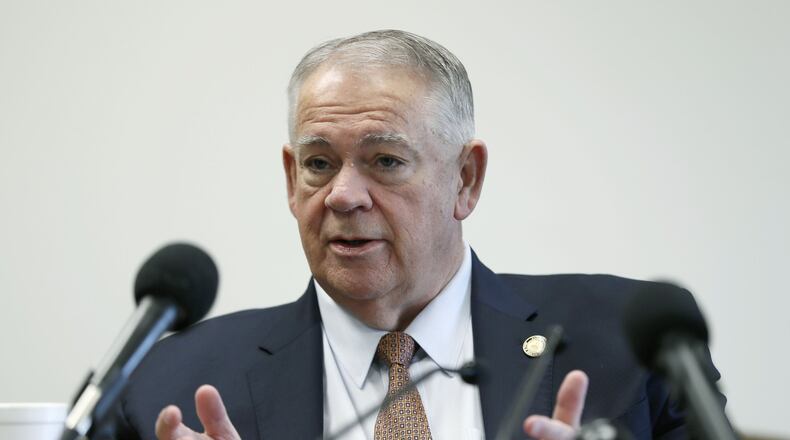Ten years ago, a grand jury indicted a Georgia man on charges of illicit sexual behavior with young teens. One of the alleged victims said it’s been so long since he heard from prosecutors, he figured the case was over with.
But it’s not. It’s among dozens of criminal cases repeatedly delayed from going to court — 14 times in this case — by defense attorney and state Speaker of the House David Ralston.
After an investigation by The Atlanta Journal-Constitution and Channel 2 Action News revealed earlier this month that Ralston was using legislative privilege to delay court dates, he has come under fire from voters, Republican activists and purported victims in the cases.
“What is most infuriating is the fact that this man’s attorney is one of the most influential people in Georgia politics,” said an alleged victim of one of Ralston’s clients, Derek Key. Key was accused of enticing a child for indecent purposes and electronically furnishing obscene materials to minors.
» LATEST DEVELOPMENTS: Stacey Abrams refused to criticize David Ralston
» EARLIER FRIDAY: Georgia leaders rally around Ralston amid threat of revolt
For more than a week, most of Ralston’s peers serving with him in the House would not touch the issue in the wake of the AJC-Channel 2 investigation, a reluctance seemingly rooted in Ralston’s substantial political power. And Ralston received a spontaneous round of applause at a closed-door meeting of Republican lawmakers Tuesday at the Capitol, the AJC learned from several sources.
But by week’s end, battle lines were drawn. Nine House Republicans signed on to a resolution introduced by Rep. David Clark calling on Ralston to resign as speaker, while such heavy hitters as Gov. Brian Kemp and two former governors signaled they support Ralston.
Now, the AJC has learned how the law came about that Ralston has been invoking to create case delays: He helped write it.
For a century, elected lawmakers who make their living as attorneys could only cite the law to delay court while the General Assembly was in session and for three weeks after. But in 2006, lawmakers in the House and Senate passed Senate Bill 503, which expanded the privilege to cover any time a lawmaker’s “presence elsewhere is required.”
Originally, the bill dealt with unrelated legal issues, then passed through the House and Senate in different forms. On the final day of that year’s session, then-House Speaker Glenn Richardson named Ralston, then a state representative who chaired the House Judicial Non-Civil Committee, to a joint conference committee to work out the differences between the House and Senate versions.
Although it is unknown what role Ralston played in conference negotiations, the legislation that emerged included the language that Ralston, who became speaker in 2010, would later apply to his own law practice. It came before the House for approval just 90 minutes before the session’s required end at midnight, passing in the House 158-2, then in the Senate unanimously.
There had been an earlier attempt that year to alter the legislative leave law. Former GOP Rep. Ed Lindsey filed a bill expanding leave to include committee meetings held outside of session. His bill also required the legislator-lawyer to give “the specific basis for the continuance and stay.”
The law that passed out of Ralston’s conference committee has no such requirement and did not limit leave to committee meetings.
Under state law, all Ralston must do to keep a client out of court is to write to the judge, saying the dates would interfere with his lawmaker duties. He can do it year-round, and judges and district attorneys have little recourse.
The AJC and Channel 2 found that Ralston has written some letters in bulk to delay cases. In 21 cases examined over a two-year period, he filed 57 requests for continuances.
"Everyone says, hire him, you'll never go to court. People talk. This is a small town." —Amanda Mosher, whose husband and child died in a vehicular homicide case that took eight years to go to trial
Asked to respond to the AJC’s findings, Ralston declined to be interviewed by the reporters of this article. However, in an interview Thurday with Channel 2, he said he had not misused the law. “To say that I’m thwarting justice and that I’m putting the public at risk, those are things that are completely not me,” he told the station.
Two Republican leaders the AJC contacted at the recommendation of Ralston’s office responded with statements of support.
House Majority Whip Trey Kelley, R-Cedartown, said he doesn’t believe the North Georgia cases are being delayed by Ralston alone.
“It’s really unfair to the speaker, because he also has a pretty important duty and an absolute right of privilege that exists between him and his client,” said Kelley, who is also an attorney. “So really, in my mind, the (AJC) article does three things: It attacks the constitutional separation of powers, it attacks the constitutional protections that the accused are afforded and then have the right to adequate representation, and it attacks the long-established legal principal of privileged conversations between an attorney.”
While case records reviewed by the AJC and Channel 2 did find occasional delays prompted by prosecutors or by Ralston’s having a conflict with another scheduled trial, his frequent use of legislative delays was what caused them to drag out for years.
Speaker Pro Tem Jan Jones, R-Milton, said in a written statement that Ralston is “a man of integrity” who has devoted his life to public service.
“I trust that the speaker is fully committed to both his demanding professional and public service obligations,” Jones said.
But Rep. Clark, R-Buford, said that after he received numerous messages from concerned constituents, he met privately with Ralston and found his answers about specific delayed cases vague.
Among the Republicans who signed on to his resolution Friday seeking Ralston's ouster was Rep. Matt Gurtler, R-Tiger. Ralston supported Gurtler's Republican opponent in last year's primary.
“What is wrong remains wrong even if it’s legal,” Gurtler said in a statement, “and Ralston’s abuse on our judicial system and failure to live up to the standard we should expect of our elected officials in this case, and others, is detrimental to the proper role of government: protecting and defending life, liberty and property.”
Some other legislators, on background, described receiving reams of emails and dozens of calls from constituents outraged about the issue.
Most calls the AJC placed to other key House leaders, including Democrats, seeking comments about Ralston’s delays in North Georgia courts weren’t returned.
Rebuke, however, came from right-leaning pundits and activists. Neal Boortz, the former radio talk show host, said Ralston should face ethics charges and sanctions from the state Bar of Georgia. Erick Erickson, the WSB radio host and editor of The Resurgent, accused Republicans of "enabling this and letting it happen."
Debbie Dooley, president of the Atlanta Tea Party, said Ralston’s prolonging of heinous criminal cases could haunt the Republican ticket in 2020.
“Their silence,” and the applause, Dooley said, “those are people that rubber stamp what he is doing. They rubber stamp him protecting accused child molesters, and rapists, and those that like to beat up women … Is that really what the Republicans in the Georgia House really want to stand for?”
"He will remove them from committees, he won't allow any legislation passed that they're interested in. He can kill it. There's a lot of things that he can do." —Debbie Dooley, Atlanta Tea Party president
There is something more basic at work in the silence from the House. A tradition, an informal rule that no one talks. It’s a code of silence in a legislature where members exchange campaign contributions and some have been punished for political disloyalty.
In the past 12 years, Ralston has donated nearly $150,000 to the Georgia Republican Party. He’s contributed nearly $300,000 to various House members’ campaign committees over the same time period.
Ralston supports representatives facing tough or expensive primary or general election challenges, but he also donates to candidates at no real risk at losing their seats. With the exception of Speaker Pro Tem Jones, Ralston has donated, at some point, to the campaign of every Republican member of the House Ethics Committee.
Dooley said few lawmakers are going to challenge Ralston in the midst of a session, when he can directly affect how much they get done for their districts.
“He will remove them from committees. He won’t allow any legislation passed that they’re interested in. He can kill it. There’s a lot of things that he can do,” she said.
A reader who contacted the AJC last week said he reached out to his state senator about Ralston. He provided the Democrat’s emailed response: “I am very worried about this and agree it is problematic. I am coordinating with my colleagues about the proper response. It is tricky because Ralston as Speaker wields a lot of power in state government.”
The Georgia Democratic Party released a statement that, while strongly worded, called for no changes other than for Ralston to keep tabs on himself. It was attributed to the state party’s communications director:
“These revelations show that Speaker Ralston has abused his power as a public servant to delay and deny justice for crime victims. As a legislator who has been given the trust of his constituents, he needs to remember his duty and put the needs of Georgia families before his own self-interest.”
Victims uniting
Well before last week’s revelations, Ralston’s repeated use of legislative leave had drawn public criticism.
Case delays played into a 2012 bar complaint filed by one of Ralston's own clients in a civil case, who said that he put off his auto accident injury case. Four years later, Ralston agreed to a public reprimand for advancing the client $22,000 from his law firm's trust account.
Around that same time, Amanda Mosher was publicly blasting Ralston for delaying a vehicular homicide case. Mosher’s husband and 4-year-old daughter died in a 2005 crash in Ellijay, and Ralston represented the man charged.
The case took more than eight years to go to court — with Ralston’s delays accounting for at least five years of waiting, Mosher said. On multiple occasions, she sat in court waiting for a hearing, only to hear the judge announce that Ralston had put off court yet again. She said that before trial, an investigator with the district attorney’s office told her that evidence had “gone stale” and witnesses had backed out of testifying.
Ralston’s client ultimately took a plea deal: one year on probation and a $1,000 fine.
Mosher, who lives in Blue Ridge, said it’s well known that clients who can afford to hire Ralston can have their cases delayed, weakening prosecutors’ cases. One of his current clients explained that strategy to the AJC and said, “That’s why I gave him 20,000 bucks.”
“Everyone says, hire him, you’ll never go to court,” Mosher said. “People talk. This is a small town.”
Mosher now wants to organize other alleged victims of Ralston’s clients and file a joint complaint with the State Bar of Georgia. She’s already been joined by a woman in a domestic violence case, the parents of a woman allegedly molested by an evangelist at age 14, and a party in a divorce case.
“If people will stand up to him, we can bring him down I think,” Mosher said. “I think we can make this stop.”
The alleged victim of Derek Key said it troubles him that Key has been free on bond for so many years after his alleged crime. Key is accused of driving him to another county for the purposes of molesting him, and of sending pornographic messages to another teenager.
“I do not want someone else to be enticed into a situation they do not want to be in,” he said in a statement to the newspaper.
Keep Reading
The Latest
Featured








